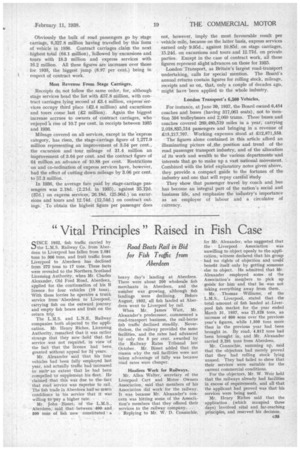"Vital Principles" Raised in Fish Case
Page 85

If you've noticed an error in this article please click here to report it so we can fix it.
Road Beats Rail in Bid for Fish Traffic from Aberdeen
QINCE 1932, fish traffic carried by the L.M.S. Railway Co. from Aberdeen to Liverpool has fallen from 2,081 tons to 366 tons, and fruit traffic from Liverpool to Aberdeen has declined from 272 tons to 17 tons. These facts were revealed to the Northern Scotland Licensing Authority. when Mr. Charles Alexander, Old Ford Road, Aberdeen, applied for the continuation of his B licence for four vehicles (10 tons). With these lorries he operates a trunk service from Aberdeen to Liverpool, carrying fish on the outward journey and empty fish boxes and fruit on the return trip.
The L.M.S. and L.N.E. Railway companies both objected to the application. Mr. Henry Riches, Licensing Authority, remarked that it was rather strange that they now -hold that . the service was not required, in view of the fact that the licence had been granted without appeal for 34 years.
Mr. Alexander said that his 'four vehicles had been fully employed last year, and actually traffic had increased to such an extent that he had been compelled to supplement his fleet. He claimed that this was due to the fact that road service was superior to rail. The fish trade in Aberdeen had so Innen confidence in his service that it was willing to pay a higher rate.
Mr. John Bisset, of the L.M.S.. Aberdeen, said that between 40D. and 500 tons of fish now constituted a ;
heavy day's landing at Aberdeen. There were about 200 wholesale fish merchants in Aberdeen, and the number was growing, although fish landings were declining. Before August, 1932, all fish landed at Aberdeen went to Liverpool by rail.
When Mr. James Watt, Mr. Alexander's predecessor, commenced a road-transport business, the rail-borne fish traffic declined steadily. Nevertheless, the railway provided the same facilities, and the rates had advanced by only the 5 per cent. awarded by the Railway Rates Tribunal last October. Mr. Bisset added that the reason why the rail facilities were not taken advantage of fully was because road rates were cheaper.
Hauliers Work for Railways.
Mr. Allen Walter, secretary of the Liverpool Cart and Motor Owners Association, said that members of his Association did work for the railway. It was because Mr. Alexander's concern was hitting some of the Association's members that they offered their services to the railway company.
Replying to Mr. W. D. Connochie,
for Mr. Alexander, who suggested that the Liverpool Association was unwilling to object openly to the application, witness declared that his group had no rights of objection and could benefit itself only by getting someone else to object. He admitted that Mr. Alexander employed some of the Association's members to pick up goods for him and that he was not taking everything away from them.
Mr. Thomas Williams, of the L.M.S., Liverpool, stated that the total amount of fish landed at Liverpool fish market for the year ended March 31, 1937, was 21,528 tons, an increase of 600 tons over the previous year's figures, while 1,500 tons more than in the previous year had been brought in. By road, 4,812 tons had been brought in, and Mr. Alexander carried 3,291 tons from Aberdeen.
Mr. Connochie, summing up, said that the objectors had merely proved that they had rolling stock lying unused. They had failed to show that their services were suitable for the current commercial conditions.
For the objectors, Mr. W. Weir held that the railways already had facilities in excess of requirements, and all that the applicant had proved was that his services were being used.
Mr. Henry Riches said that the application (which occupied three days) involved vital and far-reaching principles, and reserved his decision.




























































































































































